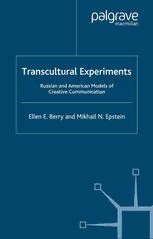
Transcultural Experiments: Russian and American Models of Creative Communication PDF
Preview Transcultural Experiments: Russian and American Models of Creative Communication
Transcultural Experiments This page intentionally left blank Transcultural Experiments Russian and American Models of Creative Communication Ellen E. Berry and Mikhail N. Epstein TRANSCULTURAL EXPERIMENTS ISBN 978-1-349-42157-2 ISBN 978-0-312-29971-2 (eBook) DOI 10.1057/9780312299712 Copyright © Ellen E. Berry, Mikhail N. Epstein 1999. All rights reserved. Printed in the United States of America. No part of this book may be used or reproduced in any manner whatsoever without written permission except in the case of brief quotations embodied in critical articles or reviews. For information, address St. Martin’s Press, 175 Fifth Avenue, New York, N. Y. 10010. Reprint of the original edition 1999 Library of Congress Cataloging-in-Publication Data Berry, Ellen E. Transcultural experiments : Russian and American models of creative communication / Ellen E. Berry and Mikhail N. Epstein. p. cm. Includes bibliographical references and index. 1. Intercultural communication. 2. United States—Relations— Russia (Federation) 3. Russia (Federation)—Relations—United States. I. Epshtein, Mikhail N. II. Title. P94.6.B475 1999 302.2—dc21 99-14323 CIP Design by Binghamton Valley Composition First edition: October 1999 10 9 8 7 6 5 4 3 2 1 To improvisational communities both actual and virtual. This page intentionally left blank Contents Acknowledgments ix Introduction Berry and Epstein 1 Part I. HISTORY 1. From Culturology to Transculture (with Appendix) Epstein 15 2. Collective Improvisation and Transcultural Consciousness Epstein 31 3. Postmodern Avant-Gardes and Cultural Reinvention Berry 56 Part II. THEORY A. Definitions 4. Transculture in the Context of Contemporary Critical Theories Epstein 79 5. From Difference to Interference Epstein 91 6. Transculture and Society Epstein 102 7. The Rehumanization of the Humanities Epstein 113 8. Nomadic Desires and Transcultural Becomings Berry 121 B. Infinitions 9. How Does Newness Enter the Postmodern World? Berry 142 10. The Permanence of Newness and Spaces for Difference: From History to Geography Epstein 152 viii Contents 11. The Ethics of Imagination Epstein 164 12.A Transcultural Imaginary Berry 169 Part III. PRACTICE 13. The Lawlessness of Genres Berry 177 A. Genres 14. On the Birth of Genres Epstein 184 15. An Essay on the Essay Epstein 189 16. The Catalog of Catalogs Epstein 195 B. Collective Improvisations 17. Improvisational Community Epstein 201 18. Sample Sessions at Universities 214 19. Nomads at Home: Improvisation in the Academy Berry 229 C. Authorship 20. Hyperauthorship: The Case of Araki Yasusada Epstein 240 21. Poetry as a State of Being: From the Notes of Ivan Solovyov Epstein 256 D. The Internet and Creativity 22. InteLnet: Web Projects in the Humanities Epstein 276 23. The Interactive Anthology of Alternative Ideas: An Introduction Epstein 290 In Place of a Conclusion: Transcultural Dialogue Berry and Epstein 302 Index of Names 323 Index of Subjects 329 Acknowledgments A bove all, I would like to thank my co-author for his dedication to this project and his generosity in sharing his many, varied, and inspiring ideas. It has been a delight and a privilege to work with him, to see from his angle of vision: an experience that has irrevocably altered my own. Thanks go as well to Kent Johnson for first introducing me to Mikhail; to the Insti- tute for Culture and Society at Bowling Green for its generous award of a fel- lowship to pursue this project; to Martin Prochazka and faculty at Charles University in Prague for their interest in this work; to Victoria Lees for her careful formatting of the manuscript and her diligent attention to prepara- tion of the index; and to Karen Wolny at St. Martin’s Press for her belief in this project. —Ellen E. Berry The transcultural project has developed through two stages, Russian (1982–89) and American (1990–98), each of which relied on the participa- tion and contributions of many colleagues. I want to thank my friends and co-thinkers Vladimir Aristov, Iosif Bakshtein, Ilya Kabakov, Aleksei Mikheev, Liudmila Pol’shakova, Boris Tseitlin, Maria Umnova, Olga Vain- shtein, and all those who participated in collective improvisations in Moscow and exemplified the spirit of improvisational community. I am also thankful to Sophia Olinova, Vladimir Tikhvinsky, Eduard Shul’man, and all those who helped to consolidate, both intellectually and organizationally, the Moscow interdisciplinary associations: the Club of Essayists, “Image and Thought,” and the Laboratory of Contemporary Culture. Without the gen- erous help and participation of these people no transcultural work or creative “interference” would be possible. Regarding the American stage, I want to thank above all my co- author, whose work of integrating the transcultural project into the framework of contemporary cultural theories was inspiring and has stimulated many conceptual innovations. Ellen believed in the truly transcultural potentials of this project and did everything a friend, a col- league, and a co-thinker can do to bring it to full realization. Her partic- ipation in the production of the manuscript and in testing the American potential for collective improvisation was invaluable.
